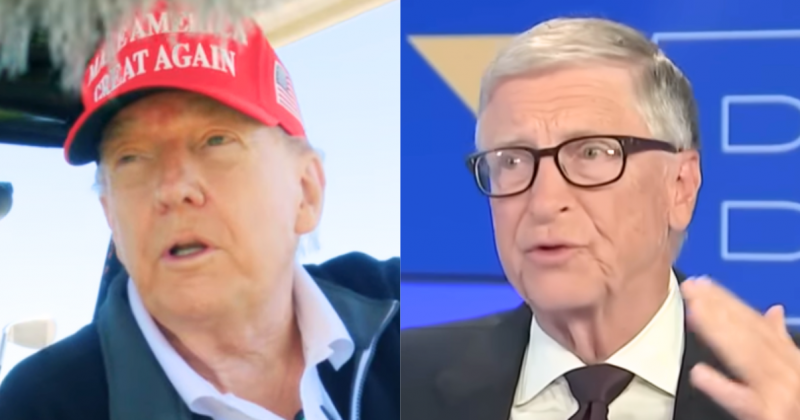Donald Trump proclaimed victory Wednesday night after Bill Gates publicly downplayed the threat of climate change to humanity’s survival.
The president took to Truth Social to celebrate what he called a major admission from one of the world’s most prominent climate advocates.
Trump has consistently questioned government climate initiatives throughout his political career.
“I (WE!) just won the War on the Climate Change Hoax. Bill Gates has finally admitted that he was completely WRONG on the issue. It took courage to do so, and for that we are all grateful. MAGA!!!” Trump wrote on the platform.
Gates, the Microsoft co-founder worth an estimated $122 billion, has spent years and vast sums of money warning about climate change’s effects on current and future generations.
His recent statements mark a notable departure from his previous messaging.
In an open letter released ahead of the United Nations COP30 climate summit in Brazil, Gates criticized what he called the UN’s doomsday approach to climate issues.
The 70-year-old billionaire argued that global leaders focus too heavily on short-term emission targets while neglecting immediate human welfare concerns.
“Although climate change will hurt poor people more than anyone else, for the vast majority of them, it will not be the only or even the biggest threat to their lives and welfare,” Gates wrote.
“The biggest problems are poverty and disease, just as they always have been.”
Gates insisted climate change remains an important problem requiring solutions. However, he placed it alongside other critical issues like malaria and malnutrition rather than above them.
“To be clear: Climate change is a very important problem. It needs to be solved, along with other problems like malaria and malnutrition,” he stated.
“Every tenth of a degree of heating that we prevent is hugely beneficial because a stable climate makes it easier to improve people’s lives,” he added.
The billionaire pointed to progress already made on climate issues.
He expressed optimism about humanity’s ability to adapt and thrive.
“People will be able to live and thrive in most places on Earth for the foreseeable future,” Gates wrote.
“Emissions projections have gone down, and with the right policies and investments, innovation will allow us to drive emissions down much further.”
Gates called for a fundamental shift in how the world approaches climate strategy.
He argued that improving human welfare should take precedence over meeting specific temperature targets.
“Our chief goal should be to prevent suffering, particularly for those in the toughest conditions who live in the world’s poorest countries,” he wrote.
Gates acknowledged potential criticism from climate activists, noting some might now consider him a hypocrite.
Gates made his priorities even clearer in subsequent comments, the Daily Mail outlined.
“If you said to me, ‘Hey, what about 0.1 degrees versus malaria eradication?’ I’ll let the temperature go up 0.1 degrees to get rid of malaria. People don’t understand the suffering that exists today,” he said.
The statements drew immediate criticism from some in the scientific community.
Michael Oppenheimer, a Princeton University professor of geosciences and international affairs, accused Gates of promoting a narrative typically used by climate skeptics.
“Despite his efforts to make clear that he takes climate change seriously, his words are bound to be misused by those who would like nothing more than to destroy efforts to deal with climate change,” Oppenheimer told The New York Times via email.
Johannes Ackva, climate work leader at Founders Pledge, defended Gates’s position, however.
“He [Gates] saw the U.S.A.I.D. situation as more pressing, and something where he could be more effective,” Ackva told the outlet.
Gates released his letter just days before global leaders gather in Belém, Brazil, for COP30.
He suggested the summit presents an opportunity to reframe climate discussions.
“It’s not too late to adopt a different view and adjust our strategies for dealing with climate change,” Gates wrote.
“COP30 is an excellent place to begin, especially because the summit’s Brazilian leadership is putting climate adaption and human development high on the agenda.”

